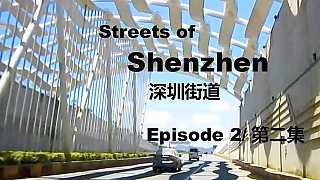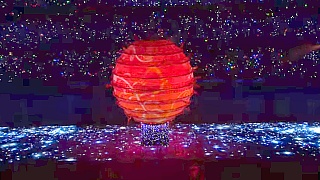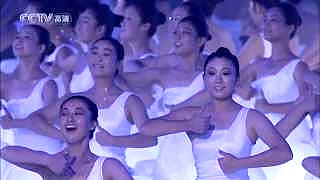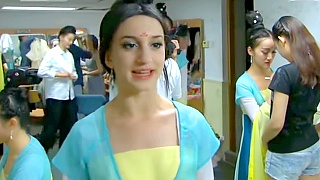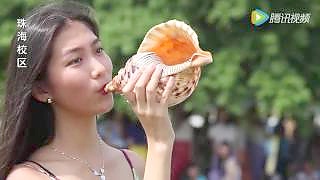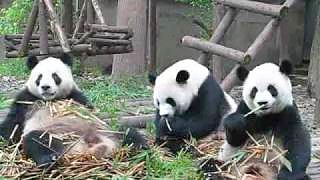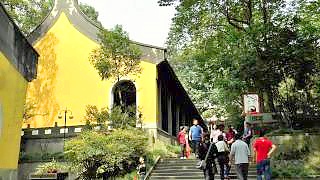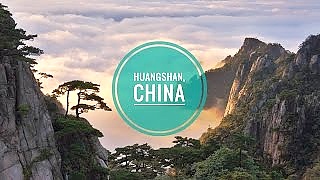Beijing is the capital of the most populous country in the world - the People's Republic of China.With a population of 15 million, and a high proportion of green space, Beijing is one of the world's most monumental cities - a place of superlatives, with the biggest central square in the world - Tian'AnMen Square - the largest and best preserved imperial palace complex - the Forbidden City - the largest sacrificial complex in the world - the Temple of Heaven - and sections of the world's largest man-made structure - the Great Wall - nearby. Having already hosted the 2008 Olympic Games, Beijing is investing billions into becoming an economic powerhouse. Beijing is a fascinating urban destination for tourists keen to immerse themselves in China's long and colourful history and culture - and its unique, vibrant take on city living, 21st century style. The frenetic building activity is creating a bold and stylish new Beijing that will surprise even if you have visited just two years ago. However, old Beijing is still to be found and is easily explored in the tea-houses and temples, the hutongs and courtyards - and the many museums. In no other capital on Earth can you enjoy such a wide variety of gourmet restaurants.Beijing offers excellent value dishes from all of China's eight regional styles of cuisine, not to mention Korean, Thai, Japanese and all manner of western dishes too. Nightlife in Beijing is kaleidoscopic - from dizzying acrobatics, martial arts displays and street theatre to puppetry, outdoor ballroom dancing, the ubiquitous karaoke and trendy nightclubs. In addition, many shops in Beijing are open until 10pm and there are restaurants on every street, often with the choice of outdoor dining under red lanterns. Beijing's new-found confidence on the world stage is best experienced during an evening spent strolling through this wonderfully welcoming city that retains an intimacy one would find hard to match. History Human activity in the Beijing area dates back around half a million years, to when 'Peking Man' lived in ZhouKouDian, in what is now the southwestern suburbs of today's Beijing. The climate at that time was warmer and more humid than it is today so forests and lakes in the area supported a wide variety of life. The fossil remains of Peking Man, his stone tools and evidence of the use of fire, as well as later tools of around 18,000 years ago, such as bone needles and articles of adornment from the age known as 'Upper Cave Man' are the earliest cultural relics on record in China today. Indeed, they are among the earliest in the world. Emperor Wu was the first to declare the site of Beijing as the capital in 1057 BC. Since then, the city has been known by the names Ji, ZhongDu, Dadu, then finally Beijing, when the name was chosen by the Ming Dynasty Emperor ChengZu in 1421. Before 1949, Beijing was known as Peking in the western world.Beijing was once again the capital only when Mao ZeDong declared the People's Republic of China on October 1st 1949. 'BeiJing' literally means 'north capital', following the common east asian tradition whereby capital cities are explicitly named as such. Another Chinese city similarly named is NanJing, meaning 'south capital'. At various times in history, the capital was declared to be NanJing rather than BeiJing, according to whether the then current power-base lay to the north or south of China. 'YanJing' is another popular informal name for Beijing, a reference to the ancient State of Yan that existed here during the Zhou Dynasty. For example, there is the locally brewed 'YanJing Beer'. Geography China is bordered by the countries of Indochina to the south, has Russia and Mongolia to the north, rising-star India to the south west, and Korea and Japan to the east.
Beijing's Latitude: | 39 55 | North |
Beijing's Longitude: | 116 23 | East |
Today, Beijing City covers an area of about 7,000 square kilometers spanning 38 kilometers from ShiJingShan in the west to TongXian in the east.
Beijing is China's second largest city in terms of population, after Shanghai.
Beijing is widely recognized as the political, educational and cultural center of China, whereas Shanghai and Hong Kong predominate in the economic field.
Beijing Municipality is centered on Beijing City and is equivalent to a province in China's administrative structure. The population is about 15 million of which about 10 million have permanent resident status.
Beijing is an independently administered municipal district, situated in the northeastern part of China at an average elevation of 43m above sea level. Beijing municipality is centered around the capital city and has a total area of 17,000 sq km (about 6,500 square miles), stretching 160 kilometres from east to west and over 180 kilometres from north to south.
Beijing Municipality borders Hebei Province to the north, west, south and, for a small section, in the east, and Tianjin Municipality to the southeast.
The 38 kilometer long Chang'An ('Eternal Peace') Boulevard that runs from east to west through central Beijing concentrates on state, political and economic affairs. The central areas around the Palace Museum (Forbidden City) and city gates, as well as the lakes - ZhongNanHai, BeiHai and HouHai - have been designated as protected landmark districts that retain the features of Old Beijing.
Transportation
Following economic reforms, Beijing has evolved to be an important transportation hub, with dozens of railways, roads and expressways entering and leaving in all directions.It is also the focal point of many international flights to China.
Sadly, although it was probably necessary, most of Beijing's city wall was removed between 1965 and 1969 to make way for the construction of the 2nd Ring Road.
The traffic network now consists of six concentric ringroads (the outer four are expressways), 28 radial roads (9 express ways), and both underground and suburban railways that are being further developed to improve links from the center with outlying areas and surrounding towns, plus several long distance railway routes and an international airport.
Following the economic reforms of Deng XiaoPing, the urban area of Beijing expanded greatly. Formerly within the confines of the 3rd Ring Road, the urban area of Beijing is now pushing at the boundary of the recently-constructed 5th Ring Road and even the 6th Ring Road that is currently under construction. Many areas of Beijing that were formerly farmland have now been developed into residential or commercial neighborhoods, although a mandatory level of green space is actively preserved.
Tourism in Beijing
China is one of the world's most visited countries. Tourism is now increasing rapidly and is forming an ever more important part of the economy. It has been projected that China may become the world's number one tourist destination by 2020.
Historical Beijing is a key attraction. The Forbidden City receives over 10 million visitors each year (foreign and domestic). In 2005, over 3.6 million foreign tourists visited Beijing, constituting an increase of 15% from 2004.
With an eye to the future, an increasing number of historical and cultural sites in Beijing are being renovated and opened to the public, a process that started long before Beijing won hosting of the 2008 Olympics.
Time Zone
Beijing's time zone is UTC/GMT +8 hours. Beijing's time zone is UTC / GMT +8 hours.
The whole of China shares the same time zone. There is no daylight saving time (or 'summer time') at the moment.
Distances from Beijing
The following table shows the distance to various cities in and just outside China.
TianJin | 111 km |
XiAn | 913 km |
Seoul, Korea | 960 km |
ShangHai | 1,068 km |
TaiPei | 1,725 km |
Hong Kong | 2,024 km |
Tokyo, Japan | 2,098 km |
Lhasa | 2,556 km |
Green City
Beijing is liberally forested and contains many parks, big and small, and its green commitment has put in place many measures to limit pollution and further improve the environment.
For example, in 2005, 8,000 outdated taxi cars and 2,000 buses were phased out and replaced with vehicles meeting newly promulgated, more rigid state standards for pollution control.
New subway lines could make Beijing's subway the world's largest by 2020.
Already with many large parks, Beijing's green space has been increased further in recent years making it a beautiful city to live or visit.
The Economy of Beijing
In 2005, Beijing's nominal GDP was 681.45 billion RMB (about 84 billion USD), a year-on-year growth of 11.1%. Beijing's per capita GDP was 44,969 RMB, an increase of 8.1% from the previous year - nearly twice as much as in the year 2000.
Beijing's industries were worth :
Primary : 9.77 billion RMB
Secondary : 210.05 billion RMB
Tertiary : 461.63 billion RMB
Urban disposable income per capita in Beijing was 17,653 RMB - a real terms increase of 12.9%. If this figure seems low compared to the West, remember that the cost of living in Beijing is also much lower.
Beijing's real estate and automobile sectors have continued to grow very well in recent years. A total of 28.032 million square metres of housing real estate was sold in 2005, for a total of 175.88 billion RMB. In 2004, the total number of automobiles registered in Beijing was 2,146,000 - a year on year increase of 18.7%, Of those, 1,540,000 were privately owned.
The Central Business District (CBD) is centered on the GuoMao area and is home to a variety of regional corporate headquarters, shopping malls and high-end housing. The 'Financial Street', in the FuXingMen and FuChengMen areas, is a traditional financial center. WangFuJing and XiDan are major shopping districts. ZhongGuanCun, often dubbed 'China's Silicon Valley', continues to be a center for electronics and computer-related industries.
Universities
Beijing is home to a great number of colleges and universities (about 160), including a number of highly-regarded universities of international stature, including China's two most prestigious institutions: Peking University and TsingHua University. Other well known institutions, domestically and internationally, include Beijing Normal University, Peking University, RenMin (People's) University of China and Beijing Foreign Studies University.
Owing to Beijing's status as the political and cultural capital of China, a larger proportion of tertiary-level institutions are concentrated here than any other place in China, reaching at least 59 in number. Many international students from Japan, Korea, North America, Europe, Southeast Asia and elsewhere come to Beijing to study every year - a growing trend, especially among Western students. At the same time, there has been a big increase in the number of Chinese studying abroad.
Language
People native to urban Beijing speak the Beijing dialect, which belongs to the Mandarin subdivision of spoken Chinese. Beijing dialect provides the basis for Standard Mandarin, the standard Chinese language used in the People's Republic of China, the Republic of China (Taiwan) and Singapore.
A romanised script of chinese called Pinyin is widely used next to the traditional chinese script on signs of all types, including place names.
There is a major drive for people to learn english and younger, educated people often speak it well. You will always find staff in hotels who can speak english. In other places, such as restaurants, this may not be the case, but there is usually someone nearby who will be happy to help.
The Beijing 2008 Olympics & Paralympics
The Summer Olympics began in Beijing on August 8th 2008 (08,08,08) - at 8pm (8 being a 'lucky' number to chinese people). This helped speed up the rate of change in Beijing so that there is now a fascinating mix of old and new, and cultural traditions rub shoulders with a new dynamism.
Beijing, the capital city of China, is a vibrant metropolis steeped in history, culture, and modernity. Here's a brief overview of what you can expect as a tourist in Beijing:
Historical Landmarks:
The Great Wall of China: One of the most iconic structures in the world, the Great Wall is easily accessible from Beijing. Mutianyu and Badaling sections are popular among tourists.
Forbidden City (Palace Museum): A UNESCO World Heritage Site, this vast imperial palace complex was home to Chinese emperors for over 500 years. It houses numerous halls, courtyards, and historical artifacts.
Temple of Heaven: A masterpiece of Chinese architecture, this ancient temple complex served as a place of worship for emperors to pray for good harvests.
Summer Palace: A stunning ensemble of lakes, gardens, and palaces, the Summer Palace served as a retreat for emperors during the Qing dynasty.
Tiananmen Square: One of the largest city squares in the world, Tiananmen Square is flanked by important landmarks such as the Monument to the People's Heroes, the Great Hall of the People, and the Mausoleum of Mao Zedong.
Cultural Sites:
Beijing Hutongs: Explore the narrow alleyways and traditional courtyard residences of Beijing's historic neighborhoods. You can take a rickshaw tour or simply wander around on foot.
Beijing Opera: Experience traditional Chinese opera performances at venues like the Liyuan Theater or the Chang'an Grand Theatre.
798 Art District: A hub of contemporary art and culture, this former industrial area is now home to numerous galleries, studios, and cafes.
Modern Attractions:
Olympic Park: Visit iconic structures such as the Bird's Nest (National Stadium) and the Water Cube (National Aquatics Center) from the 2008 Beijing Olympics.
CBD (Central Business District): Marvel at the futuristic skyline of Beijing's modern business district, which includes landmarks like the CCTV Headquarters and the China World Trade Center Tower III.
Culinary Delights:
Peking Duck: Indulge in Beijing's most famous dish, crispy roast duck served with pancakes, scallions, and hoisin sauce.
Street Food: Explore the city's vibrant street food scene and sample local delicacies like jianbing (savory crepes), lamb skewers, and dumplings.
Practical Tips:
Transportation: Beijing has an extensive public transportation system, including the subway, buses, and taxis. However, traffic can be heavy, so plan your travels accordingly.
Language: While English is not widely spoken, especially outside tourist areas, many signs and transportation announcements are in English. It's helpful to carry a translation app or a phrasebook.
Weather: Beijing experiences four distinct seasons, with hot summers and cold winters. The best times to visit are spring (April to June) and autumn (September to October) when the weather is mild and comfortable.
Etiquette: Respect local customs and traditions, such as removing your shoes before entering someone's home and using both hands to pass or receive items.
Beijing offers a rich tapestry of experiences for tourists, blending ancient heritage with modern innovations. Whether you're fascinated by history, culture, or culinary delights, there's something for everyone in this dynamic city.
 An Introduction to BeiJing
An Introduction to BeiJing
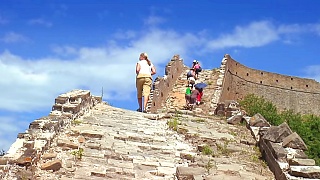
![[May 15th 2017] Heat-wave ahead ! Summer is hotting up in BeiJing this week - into the high 30s C (90s F in old money). Keep cool (keep hydrated), be cool (sensible, giving and creative), keep in touch (we love your feedback and input), and above all - love life (live more; BE love) . . . Like our site ? - help us with a donation. Something to share ? - your own film or something you like - let us know ! To have and to be - huh ? The two big verbs - to have and to be . . . Thinking through this seemingly abstract concept could change your life, for the better. Two very different ways to live; or rather - really live or not really live. To have is good, to a point; but can be a holding onto more than we really need, and a baggage of the past dragged into the future that prevents us living in the real now. For what we `have` is not just physical stuff - it is also the clutter and beliefs in our mind. To be, is to live, free of the past and all that we `have` (and `know`). Live more . . . be more . . . Listen less (to others and beliefs), and look more (and think more, based on what is, not on what you have heard). Someone once said that to love is much better than to be loved; to give so much better than to receive (have); and so it is with to have and to be . . . To be is the way. Everything taken, comes to an end. Everything given ripples through time for an eternity. To ask for nothing, and give all - that is love. To be, not to have. ~~~ You might like to read Erich Fromm`s To Have or To Be, and The Art of Love, which also explore this concept, and is essentially what the Buddha told us. Easy read; concise and potent. Also good reading : Jiddhu Krishnamurthi - for example, Commentaries on Living (three easy read volumes), and Alan Watts - for example, The Way of Zen. Blue sky BeiJing 北京](https://www.beijingbuzzz.com/bb146.jpg)


![Top videographers - bjKina, AnyuXu and DearNessie - take you on a tour of Beijing . . . First song : Going Home by Faye Wong, from the album To Love, 2003. Note : highly addictive music straight ahead . . . A fantastic video film by AnYu Xu . . . Includes a great hyperlapse along Beijing`s south-north axis, from [TianTan, the Temple of Heaven], QianMen, through Tian`AnMen, GuGong (`Old Palace`, the `Forbidden City` / Palace Museum), JingShan Park, the Drum and Bell Towers and onto the Olympic Park and Olympic Forest Park . . . New (old) BeiJing - fashion, food and the vibe, with DearNessie. A vlogging masterclass - `show don`t tell`; plus deft editing and great music . . . The beautiful, blue sky city of BeiJing 北京](https://www.beijingbuzzz.com/kk137.jpg)





